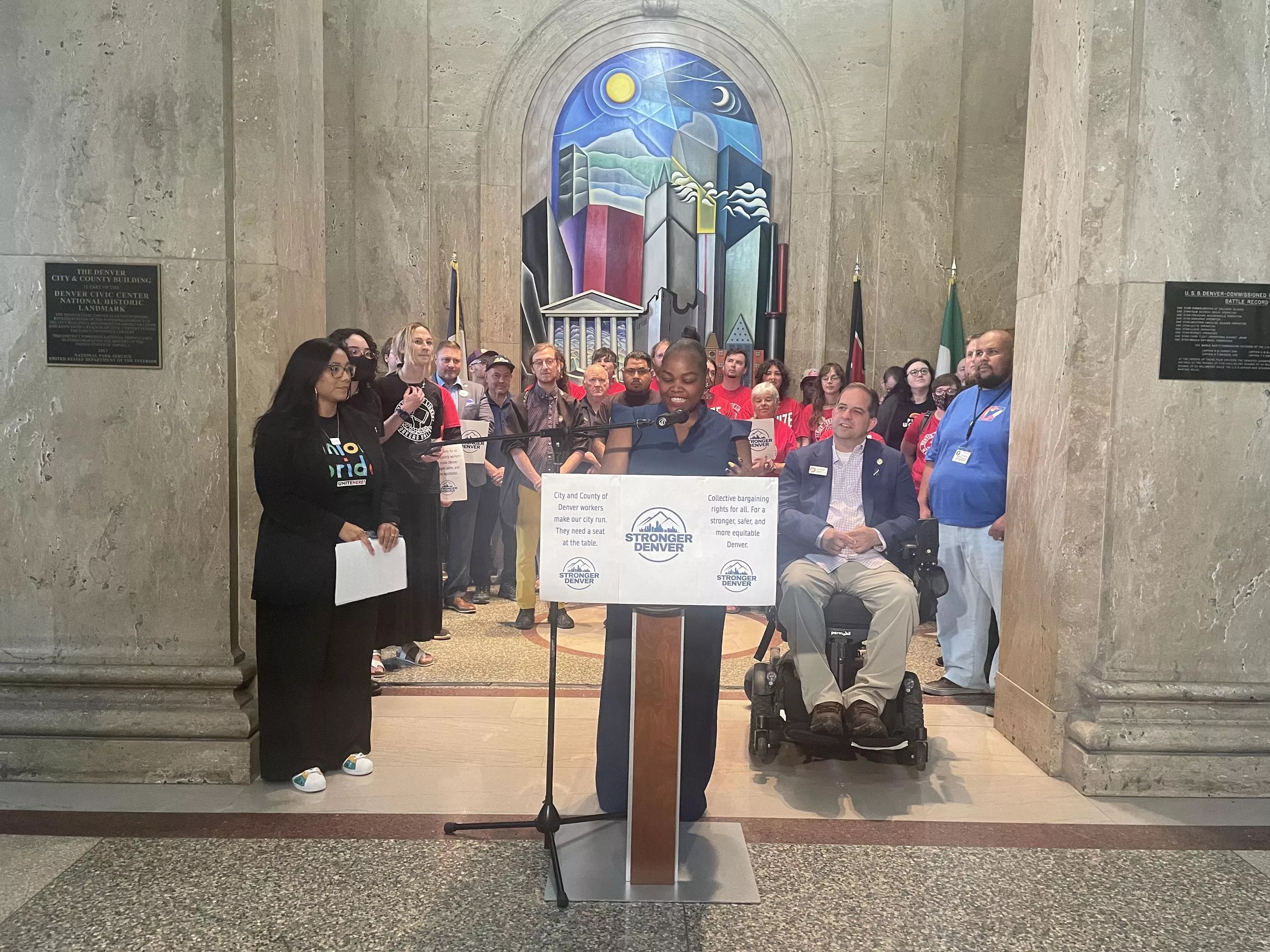
Catie Cheshire

Audio By Carbonatix
An estimated 7,000 City of Denver employees could win the right to collectively bargain if voters approve Referred Question 2U in November.
Denver Fire Department and law enforcement workers have had collective bargaining rights for decades, but employees of other city departments, such as emergency dispatch, as well as those with the Denver Public Library, Denver Water and other quasi-independent agencies are prohibited from collective bargaining by the city charter.
Collective bargaining rights allow workers to negotiate contracts with their employers and managers together rather than separately. Generally, employees unionize and then start bargaining their contracts.
“These are basic human rights,” Katie Romich, a coordinator with the Communications Workers of America, said during an October 10 forum about the ballot measure. “The United Nations considers them to be enabling rights, which is the kind of right that helps you secure other rights. For example, what collective bargaining can do is increase racial and gender justice on pay equity in the workplace. It allows you to have a voice at work.”
The ballot measure extends those rights to all city employees who aren’t supervisors, including “employees of Denver Water, the Denver Library, the City Council, the County Court, the Civil Service Commission, the Board of Adjustment and certain employees of the Auditor and Clerk and Recorder,” according to the language of 2U.
Employees would also gain the right to strike, except for those who work for Denver County Court and Denver Water. For those vital functions, bargaining disputes would instead be resolved through binding arbitration.
If employees in other departments want to strike, they would have to give 21 days’ advance notice so the city could determine which employees couldn’t strike without threatening the public health, welfare or safety.
If the measure passes, bargaining could begin starting in 2026.
“This is not a radical thing,” library worker Mabel Darling told Westword in July. “This is a basic democratic issue for people to be able to sit at the table the same way that the police and firefighters and our teachers have a seat at the table.”
Denver is an outlier compared to other big cities like Boston, Seattle and New York City. A CWA analysis found that Denver is the only top-fifty city in the country by population in a Democrat-controlled or purple state without collective bargaining rights for workers.
Research from the Economic Policy Institute found the pay gap between public-sector employees and private-sector workers with similar levels of education, experience and seniority has risen to 17.6 percent since the pandemic. In states with weak bargaining rights for public sector workers, such as Colorado, the gap is even higher, at 20.1 percent.
The Stronger Denver campaign went public nearly three years ago in its push to gain collective bargaining for more city employees. According to Denver City Council members, this ballot measure is in response to issues raised by the group back in 2021.
Councilmembers Shontel Lewis, Serena Gonzales-Gutierrez and Sarah Parady began the work to refer this measure to voters; they gained co-sponsorship from the entire council before getting approval to put it on the ballot in July.
Gonzales-Gutierrez’s experience as a caseworker at Denver Human Services and her family history of labor movement activism made the move “a no-brainer,” she said at the October 10 forum.
“I can’t tell you how many times I worked late nights, weekends and was never compensated for those things,” the at-large councilwoman said. “My well-being was not taken into consideration. … We need to make sure that our workers are being taken care of also.”
Although the measure was eventually referred to voters with support from all thirteen members of council, that wasn’t always a sure thing.
Councilman Kevin Flynn was the lone “no” vote up until the measure’s final reading. Flynn said he opposed the bill because he didn’t think it was a good idea for council aides to bargain together, even though they work for different councilmembers and have different arrangements. However, Gonzales-Gutierrez said Flynn changed his mind once he remembered his own time as a journalist with the now-defunct Rocky Mountain News, when he was represented by the Denver Newspaper Guild.
Mayor Mike Johnston also supports the ballot question.
There is no registered opposition. According to the Denver election finance dashboard, no contributions have been made against the measure; several unions and other donors have raised nearly $330,000 in support.
Should it pass, it will mark a long-awaited change, according to Lewis.
“There was a gentleman who came up to me and said, ‘I have been waiting fifty years for this,'” Lewis said at the October 10 event. “I just thought that was so beautiful and so egregious at the same time. I could appreciate the beauty in that moment, and also had such a disgust that it had taken us fifty years for something like this to come to fruition.”